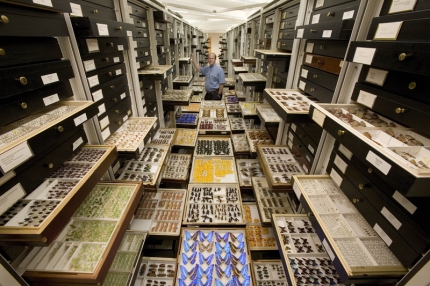Office of Science and Technology Policy Blog
#GeeksGetCovered: A Maker’s Story
Posted by on March 24, 2014 at 1:48 PM ESTPresident Obama has said that 3D printing has “the potential to revolutionize the way we make almost everything.” David Perry, an Oregon-based mechanical engineer, couldn’t agree more. As a self-described “maker”, David is working to develop useful applications for inexpensive 3D printing. One project of his is an open-source “F-F-Fiddle,” a fully 3D printable electronic violin.
Oregon-based engineer David Perry playing an open-source 3D printable electronic violin.
When the Affordable Care Act became law, David knew that it would be even easier for him to pursue his dream. He knew the health insurance marketplaces would be open, and he could access quality and affordable health care without being tied to an employer. So, starting April 1st, David will have more time to develop great ideas and help encourage everyone to “make”. David recently enrolled through the Marketplaces, and with the security of affordable, quality health coverage, he has decided to begin working full-time for the startup he founded, OpenFab PDX, which focuses on low-cost digital design and manufacturing tools.As part of the White House Office of Science and Technology Policy’s #GeeksGetCovered, effort we’ll be sharing stories about what access to affordable, quality healthcare means to geeks across America. I recently caught up with David, founder of OpenFabPDX, who shared his story with us on Twitter through @WhiteHouseOSTP’s recently launched #GeeksGetCovered effort:Learn more about Health Care
I recently caught up with David, founder of OpenFabPDX, who shared his story with us on Twitter through @WhiteHouseOSTP’s recently launched #GeeksGetCovered effort:Learn more about Health CareAgencies Abuzz During Sunshine Week
Posted by on March 21, 2014 at 2:23 PM ESTSunshine Week launched about a decade ago as a way for journalists to draw attention to the importance of transparency in government. Over the years, open government advocates and government professionals have joined the effort to promote transparency, strengthen our democracy, and promote efficiency and effectiveness in Government.
As part of Sunshine Week, Federal agencies have been highlighting their open government efforts in a variety of ways. These include engaging the public and other stakeholders in discussions around open government, hosting trainings for government workers on the importance of implementing the Freedom of Information Act (FOIA), and proactively disclosing additional government records in the public interest.
While we work year-round on open government efforts, this week we are excited to highlight achievements and progress made on open government goals. Examples from this week include:
- The State Department created a dedicated website to provide the public access to deliberations on the Keystone XL proposed pipeline project, hosting links to information about the status of the project, the Supplemental Environmental Impact Statement, and other project documents.
- Agencies held training and briefing sessions with FOIA and open government professionals to learn about new open government efforts and brush up on FOIA issues including customer service and processing. For example, the Office of the Director of National Intelligence hosted the Intelligence Community FOIA Officers Information Day which included presentations to FOIA professionals in many of the 17 agencies that comprise the government intelligence community.
- The United States formally became a candidate for the Extractive Industries Transparency Initiative, an international effort aimed at increasing transparency and accountability of payments companies make and revenues governments receive for their natural resources.
- The White House Office of Science and Technology Policy issued a memo to agencies directing Federal agencies to develop policies that will improve the management of and access to scientific collections that they own or support—including drilling cores from the ocean floor and glaciers, seeds, space rocks, cells, mineral samples, fossils, and more.
We are proud of this progress, but recognize that there is always more we can do to build a more efficient, effective, and accountable government. We look forward to the work ahead and ongoing collaborating with the public to build a more open government.
Nick Sinai is U.S. Deputy Chief Technology Officer
Corinna Zarek is Policy Advisor for Open Government
Learn more about#GeeksGetCovered: Unleashing Entrepreneurship Through Affordable Healthcare
Posted by on March 20, 2014 at 3:36 PM ESTLast week, the White House Office of Science and Technology Policy launched #GeeksGetCovered, an effort focused on raising awareness, sharing stories, and encouraging healthcare enrollment among geeks, innovators, and entrepreneurs.This initiative builds on the Obama Administration’s work to help ensure that geeks across the country, those coming up with new discoveries and exciting inventions—and creating jobs along the way—have the freedom and security to keep innovating, not worrying about access to healthcare.As the March 31st deadline for 2014 coverage nears, we’ll be sharing stories about what access to affordable, quality healthcare means to geeks across America.I recently caught up with American entrepreneur Tatyana Kanzaveli, who co-founded the startup Open Cancer Network. She shared her story as a tech entrepreneur and cancer survivor, and discussed how the security of having access to affordable coverage helped her make the decision to start her own company.And, while Tatyana’s story is extraordinary, she is not alone. There is strong evidence that when affordable healthcare isn’t exclusively tied to employment, in more instances people choose to start their own companies. By finding a plan on HealthCare.gov, more Americans can make the leap to entrepreneurship and pursue their dreams, without worrying that a preexisting condition or new illness will bankrupt their families.
Tatyana Kanzaveli, Co-Founder, Open Cancer Network
How did affordable health coverage enable you to start your first company?A year ago, out of nowhere, I was diagnosed with cancer. The health coverage I had from my previous employer was expiring, so I started calling insurance brokers about how to get coverage as an individual. They all said that because of my cancer diagnosis, I was uninsurable.Can you imagine? I was in shock. For decades I had been paying premiums, and never used the insurance—and now that I need it, I’m uninsurable? What am I supposed to do?I needed to find any option that would cover me until January 1, when the Affordable Care Act would kick in and eliminate discrimination based on my preexisting condition. I finally found one option that cost over $1,200 month, and the coverage was horrible, so I had to pay for a lot of my cancer treatment out of pocket – but it was the only way for me to stay insured.I applied for Obamacare on Day 1, as soon as my state’s exchange opened up. I got the highest level of coverage, and it cut my premiums in half.Now I can be an entrepreneur, and do something I think is important to do.What sparked the idea for your company?Imagine what it’s like to go in for a regular check-up and be diagnosed with cancer. I never drank or smoked, I always exercised and had a healthy diet.Once I recovered from my shock, I started asking my doctors questions: “Do you have any hypotheses about why this is happening to me?” The answer I was given: “We don’t have hypotheses, because we don’t have data.”In my experience, right now, the healthcare system functions in a reactive mode – you get sick, you see a doctor, you get treated. But your doctors don’t know very much about your family history, your environment, and the stressors you’ve experienced.Our goal is to build the largest and most comprehensive set of nonclinical patient data, in order to improve outcomes for cancer and other chronic diseases. We’re starting by building a mobile-native social network that lets cancer patients connect with similar patients, as well as researchers and physicians with relevant expertise. If the patient so chooses, she can report data about her mood, level of appetite, and other lifestyle behaviors.We correlate this private patient data with massive amounts of open government data, and use powerful algorithms to generate hypotheses based on this data. This will allow hospitals and scientists to do unprecedented research on the causes of disease, and will allow patients to get better treatment.What was your path to becoming an entrepreneur?I grew up in Azerbaijan in the former Soviet Union, where I earned a Master’s degree in computer science and became a programmer at the Academy of Science there. When war broke out in 1989, I fled to the United States with my husband and three-year-old daughter. We were refugees living in an empty apartment, but I was incredibly lucky – two weeks after we arrived, a friend called me and said, “I just had a job interview. I didn’t pass it, but I thought of you.”I’d never had a job interview before. I was clueless, and my English was just okay. I barely understood what the interviewer was saying, but when he gave me half an hour to look at his company’s code, I thought: “Oh, I can speak that language!” The next day, I was hired.I eventually worked as a technologist at some very large companies, and then took on various roles at technology startups, including as CEO. I had mentored a great many startups along the way, but never started my own!I’m finding that the most satisfaction you can get is when you start your own company.Have you encountered any other entrepreneurs who needed affordable health coverage to get started?Absolutely – for one, my co-founder Maksim Tsvetovat. I got to know Max through his academic work on data science. He has a wife and small child, so it was very daunting for him to quit his job and lose that health coverage. But he was able to get a high-quality plan through the Affordable Care Act, and this made it possible for us to launch our startup.For me, the impact of affordable healthcare has been profound.Doug Rand is Assistant Director for Entrepreneurship at the White House Office of Science and Technology PolicyFossils, Seeds, and Space Rocks: Improving the Management of and Access to the Nation’s Scientific Collections
Posted by on March 20, 2014 at 8:00 AM ESTIn a memorandum released today, OSTP Director John P. Holdren directs Federal agencies to develop policies that will improve the management of and access to scientific collections that they own or support.
Collections manager David Furth shows some of the diversity in the insect collection at the Smithsonian National Museum of Natural History. (Photo by Chip Clark, Smithsonian Institution)
Scientific collections are assemblies of physical objects that are valuable for research and education—including drilling cores from the ocean floor and glaciers, seeds, space rocks, cells, mineral samples, fossils, and more. Federal agencies develop and maintain scientific collections as records of our past and investments in our future.
These collections are public assets. They play an important role in promoting public health and safety, homeland security, trade, and economic development, medical research, resource management, education, and environmental monitoring.
They are studied across diverse fields of research and are used and re-used to validate and extend past research results as new analytical techniques develop. For the American public, students, and teachers, they are also treasure troves of information ripe for exploration and learning.
And there is no better time to highlight this important new policy than Sunshine Week – an annual celebration of transparency and public participation in government.
The memorandum released today fulfills the requirements of the America COMPETES Reauthorization Act of 2010 that called on OSTP to develop “policies for the management and use of Federal scientific collections to improve the quality, organization, access, including online access, and long-term preservation of such collections for the benefit of the scientific enterprise.”
Learn more about Innovations, EthicsBuilding a More Open Government
Posted by on March 19, 2014 at 4:55 PM ESTIt’s Sunshine Week again—a chance to celebrate transparency and participation in government and freedom of information. Every year in mid-March, we take stock of our progress and where we are headed to make our government more open for the benefit of citizens.
In December, 2013, the Administration announced 23 ambitious commitments to further open up government over the next two years in U.S. Government’s second Open Government National Action Plan. Those commitments are now all underway or in development, including:
· Launching an improved Data.gov: The updated Data.gov debuted in January, 2014, and continues to grow with thousands of updated or new government data sets being proactively made available to the public.
· Increasing public collaboration: Through crowdsourcing, citizen science, and other methods, Federal agencies continue to expand the ways they collaborate with the public. For example, the National Aeronautics and Space Administration, for instance, recently launched its third Asteroid Grand Challenge, a broad call to action, seeking the best and brightest ideas from non-traditional partners to enhance and accelerate the work NASA is already doing for planetary defense.
· Improving We the People: The online petition platform We the People gives the public a direct way to participate in their government and is currently incorporating improvements to make it easier for the public to submit petitions and signatures.
At the same time we have made important progress to improve the Freedom of Information Act (FOIA) – which provides the public with a statutory right to request and receive information from their government. Agencies are receiving more requests each year. In fiscal year 2013, agencies received more than 700,000 FOIA requests, up 8 percent from the previous year, and processed 678,000 requests, also an increase from the previous year. In the past five years, agencies have processed more than 3.1 million FOIA requests. FOIA continues to be a priority for the Administration in a variety of ways, and we are committed to further modernizing the process:
· Engaging with the Public: Today there are number of avenues through which government leaders and FOIA professionals can directly interact with the public. For example, the Department of Justice (DOJ) and the National Archives and Records Administration (NARA) now host quarterly FOIA Requester Roundtables with government FOIA professionals and FOIA requesters.
· Recognizing FOIA Expertise: FOIA professionals were recently “professionalized” into their own field, in terms of job categories offered by the Office of Personnel Management (OPM). OPM created the new 0306 Government Information Specialist job series which recognizes the importance of these skills and positions.
· Establishing a FOIA Ombudsman: The Office of Government Information Services opened in 2009 to introduce dispute resolution into the FOIA process and has now assisted with thousands of FOIA inquiries and disputes from agencies and the public.
There is much to celebrate this Sunshine Week but still much more work to be done. We look forward to continuing to work together to identify ways to build a more efficient, effective, and accountable government.
Corinna Zarek is Policy Advisor for Open Government
Learn more aboutMore Big (Data) Ideas
Posted by on March 18, 2014 at 9:53 PM ESTOn March 17, the White House Office of Science and Technology Policy, the Data & Society Research Institute, and New York University co-hosted the second in a series of public events focused on big data that OSTP is co-hosting with academic institutions across the country. The full-day workshop focused on the social, cultural, and ethical dimensions of big data. The day concluded with a public plenary session, featuring an active discussion with a panel of experts covering a range of issues including privacy, the use of genetic data, educational applications, and financial inclusion. The webcast of the public session, as well as materials from the day’s workshops will be available here.
We will continue to build on the ideas developed in the first two workshops at the Massachusetts Institute of Technology and New York University at a third event on April 1st in Berkeley, California. This workshop will be co-hosted by OSTP and the School of Information at the University of California at Berkeley and the Berkeley Center for Law and Technology, and will focus on the values and governance issues raised by big data technologies. You can find more information about the workshop and the webcast here.
Nicole Wong is U.S. Deputy Chief Technology Officer at the White House Office of Science & Technology Policy
- &lsaquo previous
- …
- 36
- 37
- 38
- 39
- 40
- 41
- 42
- 43
- 44
- …
- next &rsaquo
White House Blogs
- The White House Blog
- Middle Class Task Force
- Council of Economic Advisers
- Council on Environmental Quality
- Council on Women and Girls
- Office of Intergovernmental Affairs
- Office of Management and Budget
- Office of Public Engagement
- Office of Science & Tech Policy
- Office of Urban Affairs
- Open Government
- Faith and Neighborhood Partnerships
- Social Innovation and Civic Participation
- US Trade Representative
- Office National Drug Control Policy
categories
- AIDS Policy
- Alaska
- Blueprint for an America Built to Last
- Budget
- Civil Rights
- Defense
- Disabilities
- Economy
- Education
- Energy and Environment
- Equal Pay
- Ethics
- Faith Based
- Fiscal Responsibility
- Foreign Policy
- Grab Bag
- Health Care
- Homeland Security
- Immigration
- Innovation Fellows
- Inside the White House
- Middle Class Security
- Open Government
- Poverty
- Rural
- Seniors and Social Security
- Service
- Social Innovation
- State of the Union
- Taxes
- Technology
- Urban Policy
- Veterans
- Violence Prevention
- White House Internships
- Women
- Working Families
- Additional Issues


